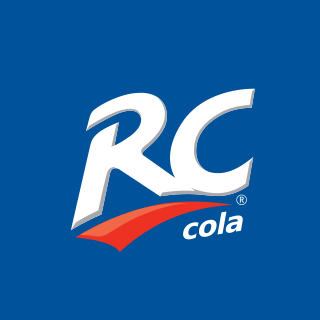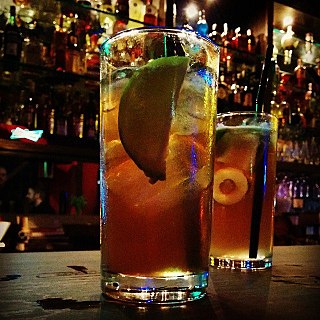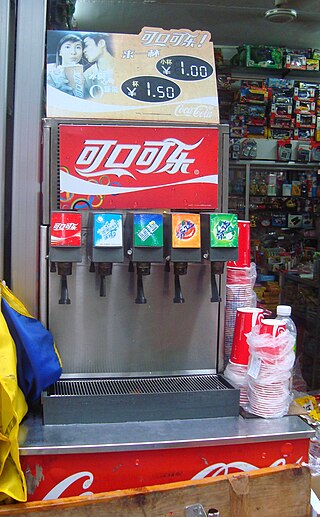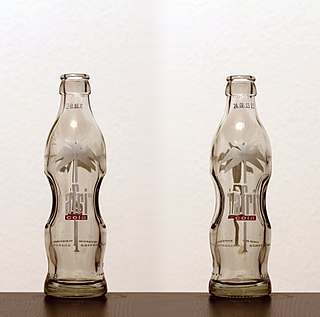
Coca-Cola, or Coke, is a carbonated soft drink with a cola flavor manufactured by the Coca-Cola Company. In 2013, Coke products were sold in over 200 countries worldwide, with consumers drinking more than 1.8 billion company beverage servings each day. Coca-Cola ranked No. 87 in the 2018 Fortune 500 list of the largest United States corporations by total revenue. Based on Interbrand's "best global brand" study of 2020, Coca-Cola was the world's sixth most valuable brand.

Cola is a carbonated soft drink flavored with vanilla, cinnamon, citrus oils, and other flavorings. Cola became popular worldwide after the American pharmacist John Stith Pemberton invented Coca-Cola, a trademarked brand, in 1886, which was imitated by other manufacturers. Most colas originally contained caffeine from the kola nut, leading to the drink's name, though other sources of caffeine are generally used in modern formulations. The Pemberton cola drink also contained a coca plant extract. His non-alcoholic recipe was inspired by the coca wine of pharmacist Angelo Mariani, created in 1863.

Pepsi is a carbonated soft drink with a cola flavor, manufactured by PepsiCo. As of 2023, Pepsi is the second most valuable soft drink brand worldwide behind Coca-Cola; the two share a long-standing rivalry in what has been called the "cola wars".

RC Cola is a cola-flavored carbonated beverage owned in the United States by Keurig Dr Pepper and internationally by RC Global Beverages, Inc.

The Long Island iced tea, or Long Island ice tea, is an IBA official cocktail, typically made with vodka, tequila, light rum, triple sec, gin, and a splash of cola. Despite its name, the cocktail does not typically contain iced tea, but is named for having the same amber hue as iced tea.

Capitol Hill is a densely populated residential district in Seattle, Washington, United States. One of the city's most popular nightlife and entertainment districts, it is home to a historic gay village and vibrant counterculture community.

Tab was a diet cola soft drink produced and distributed by The Coca-Cola Company, introduced in 1963 and discontinued in 2020. The company's first diet drink, Tab was popular among some people throughout the 1960s and 1970s as an alternative to Coca-Cola. Several variations were made, including a number of fruit-flavored, root beer, and ginger ale versions. Caffeine-free and clear variations were released in the late 1980s and early 1990s.

Surge is a citrus-flavored soft drink first produced in the 1990s by the Coca-Cola Company to compete with Pepsi's Mountain Dew. Surge was advertised as having a more "hardcore" edge, much like Mountain Dew's advertising at the time, in an attempt to lure customers away from Pepsi. It was originally launched in Norway as Urge in 1996, and was so popular that it was released in the United States as Surge in 1997. Lagging sales caused production to be ended in 2003 for most markets.
Jones Soda Co. is a beverage company based in Seattle, Washington, United States. It bottles and distributes soft drinks, non-carbonated beverages, energy drinks, and candy.

A soda fountain is a device that dispenses carbonated soft drinks, called fountain drinks. They can be found in restaurants, concession stands and other locations such as convenience stores. The artifact combines flavored syrup or syrup concentrate and carbon dioxide with chilled and purified water to make soft drinks, either manually, or in a vending machine which is essentially an automated soda fountain that is operated using a soda gun. Today, the syrup often is pumped from a special container called a bag-in-box (BiB).

The Coca-Cola Company is an American multinational corporation founded in 1892. It produces Coca-Cola. The drink industry company also manufactures, sells, and markets other non-alcoholic beverage concentrates and syrups, and alcoholic beverages. The company's stock is listed on the NYSE and is part of the DJIA and the S&P 500 and S&P 100 indexes.

OK Soda is a discontinued soft drink created in 1993 that courted the American Generation X demographic with unusual advertising tactics, including neo-noir design, chain letters and deliberately negative publicity. After the soda did not sell well in select test markets, it was officially declared out of production in 1995 before reaching nationwide distribution. The drink's slogan was "Things are going to be OK."

Afri Cola is a cola soft drink produced in Germany. The trademark Afri-Cola was registered in 1931 by the company F. Blumhoffer Nachfolger GmbH. The same company also produced Bluna, an orange soft drink. Today the brand belongs to the Mineralbrunnen Überkingen-Teinach AG. Afri Cola was once one of the most popular cola brands in Germany, but has lost considerable market share since the 1960s.

The World of Coca-Cola is a museum located in Atlanta, Georgia, United States, showcasing the history of The Coca-Cola Company. The 20-acre (81,000 m2) complex opened to the public on May 24, 2007, relocating from and replacing the original exhibit, which was founded in 1990 in Underground Atlanta. There are various similar World of Coca-Cola stores in locations such as Las Vegas and Disney Springs.

Coca-Cola Zero Sugar is a diet cola produced by the Coca-Cola Company.

Coca-Cola Cherry is a cherry-flavored version of Coca-Cola. It is produced and distributed by the Coca-Cola Company and its bottlers in the United States and some international markets.

Espresso Vivace is a Seattle area coffee shop and roaster known for its coffee and roasting practices. Vivace's owner, David Schomer, is credited with developing and popularizing latte art in the United States.

Coca-Cola Freestyle is a touch screen soda fountain introduced by The Coca-Cola Company in 2009. The machine features 165 different Coca-Cola drink products, as well as custom flavors. The machine allows users to select from mixtures of flavors of Coca-Cola branded products which are then individually dispensed. The machines are currently located in major Coca-Cola partners and retail locations as a part of a gradual and ongoing deployment.
Names for soft drinks in the United States vary regionally. Soda and Pop are the most common terms for soft drinks nationally, although other terms are used, such as, in the South, Coke. Since individual names tend to dominate regionally, the use of a particular term can be an act of geographic identity. The choice of terminology is most closely associated with geographic origin, rather than other factors such as race, age, or income. The differences in naming have been the subject of scholarly studies. Cambridge linguist Bert Vaux, in particular, has studied the "pop vs. soda debate" in conjunction with other regional vocabularies of American English.

















